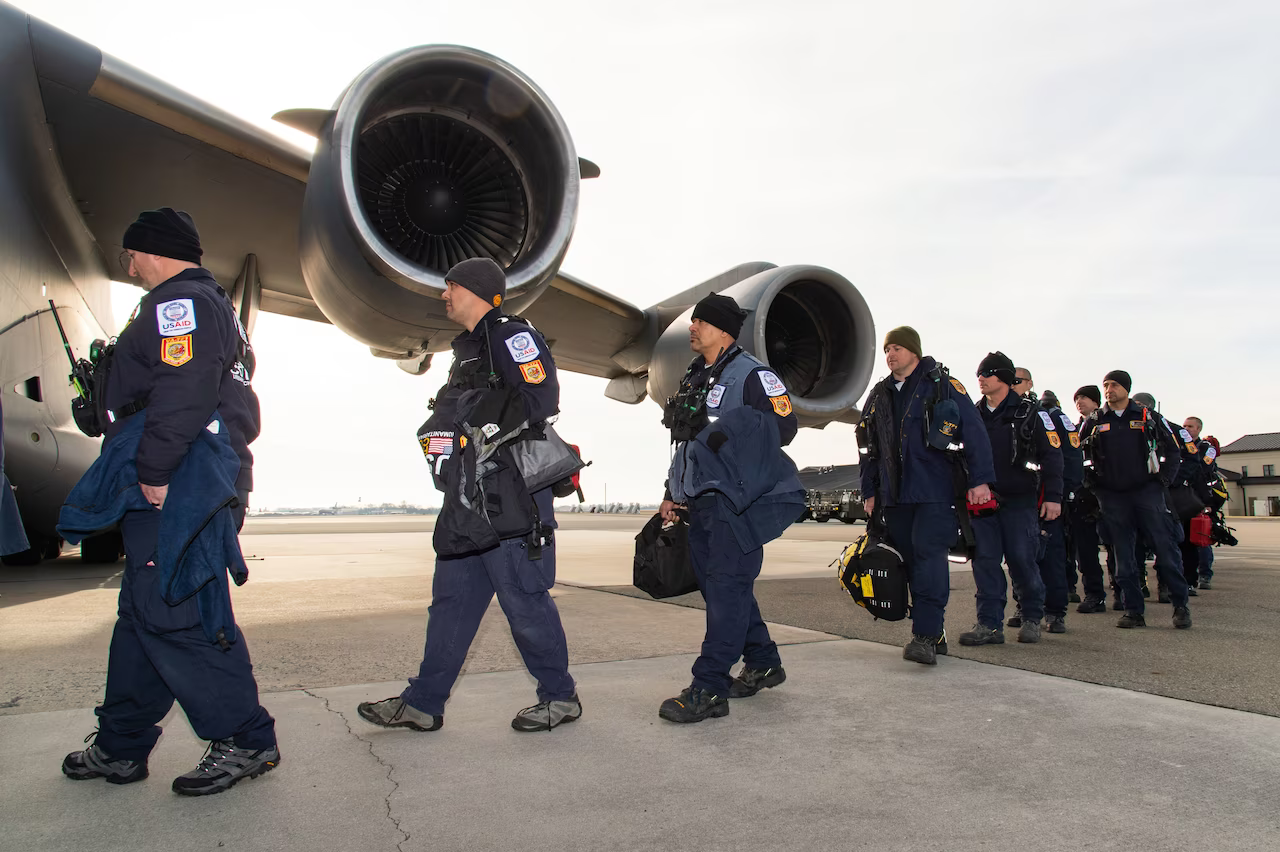The earthquake that struck both Syria and Turkey have left behind a wave of repercussions that includes the disruption of UN aid from Turkey to the areas controlled by the Syrian opposition. This has prompted the US to change in its policy towards Syria that aimed to isolate the regime of through harsh sanctions, and to halt any attempt to improve relations between Syria and other countries after twelve years of conflict since March 2011.
However, there are two problems facing the flow of US aid specifically to Syria, one of which is related to the divergence of US domestic reactions, which add a contradiction to the policy adopted by Washington, while the second relates to the complications with the operations of providing aid inside Syria.
Shifts in the Strategy
The most prominent changes that the US has undertaken to help Turkey and Syria deal with the aftermath of the earthquake are as follows:
- Pledges of aid to both countries: The US administration expressed its support for Turkey in the aftermath of the earthquake, this was made clear by many officials including the National Security Adviser Jake Sullivan, Secretary of Defense Lloyd Austin, and Secretary of State Anthony Blinken. Whilst contacting their Turkish counterparts, the affirmed the US’s commitment to support its NATO ally closely during this trying time. USAID Chief Samantha Power spoke to the head of the Syrian Civil Defense (the White Helmets) as President Biden has directed USAID to work closely with international partners in assistance efforts. The US has decided to provide $85 million in assistance from the agency’s funding to Turkey and Syria, whilst sending US rescue personnel to the affected areas, and deploy USAID’s disaster response and assistance team (DARTs) in southern Turkey.
- Responding to Syrian Accusations of US hindrance to aid: The Syrian Foreign Minister Faisal Al Maqdad criticized the US sanctions that were in place on the Syrian regime as being a hindrance and an obstacle to having aid reach ordinary Syrians as a result of the devastating earthquake that has taken place. In response to these criticisms the near east office of the state department tweeted on the same day that the US is supporting all humanitarian efforts to reach Syrians affected by the earthquake and that it is moving quickly to provide aid and assistance to all those affected. They also affirmed that US sanctions are still in place against the regime do not affect humanitarian aid, even in the areas controlled by the regime, noting that the US is the biggest provider of humanitarian aid to all of Syria as more than 15 billion dollars of aid have been provided to Syria since the start of the civil war.
- Removing Sanctions off of humanitarian aid: As per the guidance of the US State Department’s statement not to have sanctions imposed on the Syrian regime impede on humanitarian aid for those affected by the earthquake, the Office of Foreign Assets of the US Treasury announced the issuance of General License 23 for Syria. This license aims to assist in Relief efforts for the millions of Syrians affected by the disaster, as it will allow for 180 days for all aid to reach earthquake victims, which was prohibited under the sanctions imposed on Syria.
The US provides aid to the Syrians affected by the earthquake through local partners, because it refuses to deal with the Syrian regime, and demands accountability for those responsible for violations during the civil war. This was made all the clearer by State Department spokesman Ned Price on February 6, where he stated that the US will not deal with the Syrian government, but will work through Syrian NGOs to provide aid to all Syrians.
- US Legislative Support for Turkey and Syria: Several Democratic and Republican lawmakers issued statements expressing solidarity with the Turkish and Syrian people in the aftermath of the earthquake. On February 9, Republican Representative Pete Sessions submitted a resolution urging the US administration to provide immediate assistance to Turkey given the strategic position of the US in the Middle East and NATO. On the day of the earthquake, Democratic Senator Bob Menendez, chairman of the Senate Foreign Relations Committee, issued a statement confirming the US’s continued work to ensure that all assistance is being provided to all affected Syrian civilians “who have already been displaced or terrorized by twelve years of unspeakable violence.”
- US and EU Leadership Efforts to Support Relief Efforts: The two political giants are working in close coordination with the US Department of Defense and the US State Department, USAID and other US partners, to provide assistance to those affected by the earthquake in both Syria and Turkey. On February 8, the commander of the US Central Command, General Michael Korella, announced the Central Command’s plans to support relief efforts for those affected by the recent earthquakes in Syria and Turkey. Central Command headquarters in Tampa, Florida, has set up a task force to prepare for increased support for those affected. For its part, the US and European Command put military capabilities, personnel, and equipment to assist the Turkish government in its ongoing search and rescue efforts in the aftermath of the earthquake. All of this is part of its efforts to support ongoing US assistance led by USAID.
A team from the command arrived at Turkey’s Incirlik Air Base on February 9 to determine how the US military can quickly respond with capabilities and equipment to support the assistance the Turkish government’s requests through USAID. US planes carried out missions from the base to transport the injured to a local medical facility, and US Black Hawk helicopters transported rescue personnel to locations where they are most needed during rescue operations and are difficult to reach given the extent of the destruction. The base serves as the hub for humanitarian aid flowing into the affected areas as U.S. Air Force pilots are supporting Turkish forces in offloading thousands of tons of aid from global allies and partners.
Two Primary Concerns
The continued flow of US aid to Syria faces two main obstacles: the first a US issue. Despite the support of many Democratic and Republican lawmakers for the lifting of US sanctions on the Syrian regime to facilitate the delivery of humanitarian aid to those affected by the earthquake, there is a faction within US Congress that is rejecting the US administration’s decision to suspend sanctions on Syria.
Michael McCaul, Chairman of the Foreign Affairs Committee in the House of Representatives, issued a statement, on February 8, where he spoke of “not allowing the Syrian regime and its supporters to hold the Syrian people hostage amidst the massive devastation left by the earthquake.” Two days later, he issued another statement with several prominent member of the committee such as James Rich, where they opposed the US administration’s decision to temporarily suspend sanctions on the Syrian regime, to allow for humanitarian aid to reach the affected areas. They saw this as a step that would undermine the long-standing policies of former US administrations to confront the Syrian regime. The statement sees that this maybe contradicting US policy, that at current is confusing how to deal with the political and on ground developments that are occurring in Syria.
The second is Syria, where the presence of terrorist organizations in most of the opposition-held territory limits the types of aid that many donors are prepared to provide to Syria. This is in addition to the relief efforts in Syria facing challenges due to the political divisions left by the war, further slowing down the delivery of humanitarian aid to affected Syrians, along with fears that Iran will exploit the earthquake crisis to smuggle weapons to Syria under the guise of aid.


